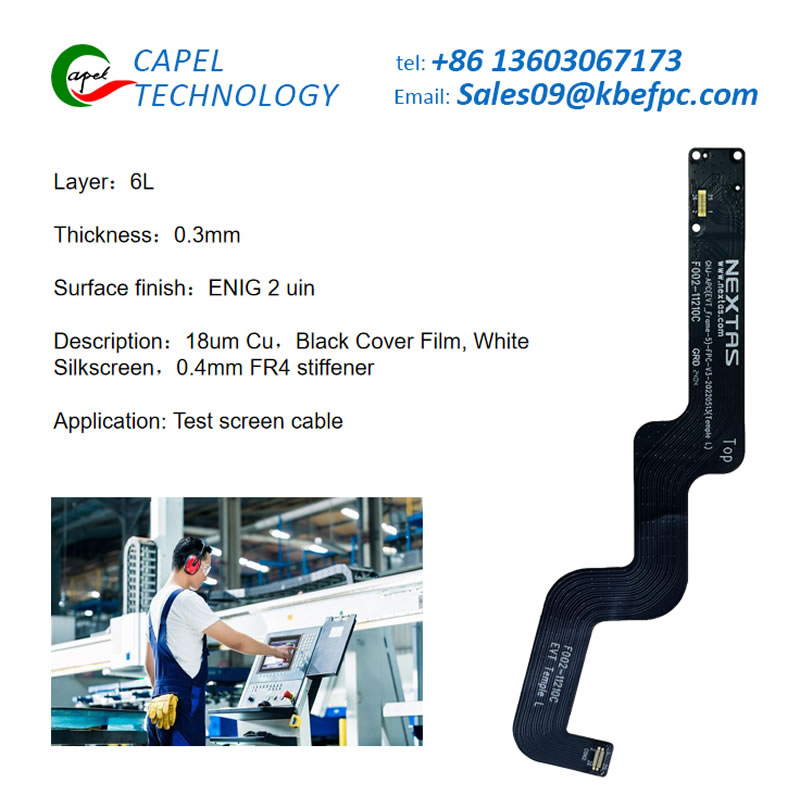Date: 2025-07-02
In the rapidly evolving world of electronics, the demand for high-performance, compact, and reliable components is ever-increasing. One such component that has gained significant traction is the multi-layer flexible printed circuit (FPC). This article explores the intricacies of custom multi-layer FPC manufacturing, focusing on the specifications such as surface finish, board thickness, and the manufacturing process, particularly in the context of test screen cable fields.
Multi-layer FPCs are essential in modern electronic devices, providing a lightweight and flexible solution for complex circuit designs. Unlike traditional rigid PCBs, multi-layer FPCs can bend and twist, making them ideal for applications in smartphones, wearables, and other compact devices. The ability to customize these products allows manufacturers to meet specific requirements, ensuring optimal performance in various applications.
Customization is at the heart of multi-layer FPC manufacturing. Each project may have unique requirements based on the application, such as size, shape, and electrical performance. Manufacturers work closely with clients to develop tailored solutions that meet their specifications. This collaboration often involves detailed discussions about the intended use of the FPC, the environment it will operate in, and any specific regulatory standards that must be adhered to.

One of the critical aspects of multi-layer FPC manufacturing is the surface finish. A common choice for high-quality FPCs is the Electroless Nickel Immersion Gold (ENIG) finish, specifically at a thickness of 2uin. This surface finish offers several advantages:
Corrosion Resistance: ENIG provides excellent protection against oxidation and corrosion, ensuring the longevity of the circuit.
Solderability: The gold layer enhances solderability, making it easier to attach components during assembly.
Flatness: ENIG finishes are known for their flatness, which is crucial for ensuring reliable connections in multi-layer designs.
By opting for an ENIG 2uin surface finish, manufacturers can ensure that their multi-layer FPCs maintain high performance and reliability throughout their lifecycle.
The thickness of the board is another critical factor in multi-layer FPC manufacturing. A common specification is a thickness of 0.3mm, which strikes a balance between flexibility and durability. This thickness allows for intricate designs while maintaining the structural integrity required for various applications.
Thin boards are particularly advantageous in compact devices where space is at a premium. However, achieving the right thickness requires precision in the manufacturing process to ensure that the FPC can withstand mechanical stress without compromising performance.
The manufacturing process of multi-layer FPCs involves several stages, each requiring meticulous attention to detail. Here’s a brief overview of the key steps involved:
Design and Prototyping: The process begins with the design phase, where engineers create detailed schematics and layouts. Prototyping allows for testing and validation of the design before mass production.
Material Selection: Choosing the right materials is crucial. High-quality polyimide or polyester films are often used for their excellent thermal and electrical properties.
Layer Stacking: In multi-layer FPCs, layers are stacked and aligned precisely. This step is critical for ensuring that the electrical connections between layers are reliable.
Etching and Plating: The circuit patterns are created through etching, followed by plating to build up the necessary copper thickness.
Surface Finishing: After etching, the ENIG surface finish is applied, providing the necessary protection and solderability.
Testing: Rigorous testing is conducted to ensure that the FPC meets all specifications. This includes electrical testing, mechanical stress tests, and thermal cycling tests.
Final Inspection and Quality Control: Before shipping, each FPC undergoes a final inspection to ensure it meets the required standards. Quality control is paramount in the manufacturing process to prevent defects and ensure reliability.
One of the significant applications of custom multi-layer FPCs is in the test screen cable field. These cables are essential for connecting various components in testing environments, ensuring that signals are transmitted accurately and efficiently. The flexibility and compactness of multi-layer FPCs make them ideal for this application, allowing for easy routing and installation in tight spaces.
In test screen cable applications, the reliability of the FPC is paramount. Any failure in the cable can lead to inaccurate test results, making it crucial for manufacturers to adhere to strict quality control measures throughout the production process.
Kaboer manufacturing PCBs since 2009. Professional technology and high-precision Printed Circuit Boards involved in Medical, IOT, UAV, Aviation, Automotive, Aerospace, Industrial Control, Artificial Intelligence, Consumer Electronics etc..